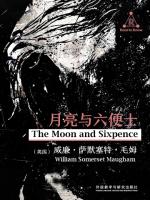A Brief Review
中大燕双鹰
"The Moon and Sixpence" was written in 1919, just after the
first World War, in an era of new order and hope in Europe.Somerset
Maugham, then 45, was at the height of his creative powers, and The Moon
and Sixpence was his masterpiece in his heyday and his most important
work. The main character, Strickland, is based in gauguin. The Moon and
Sixpence is written from the point of view of a young writer whose name
does not appear. In The Moon and Sixpence, I find it interesting that
Maugham illustrates his commonality with Gauguin by describing a
character in “my” mouth who seems to be completely independent of the
story: the genius doctor Abraham. From the time the doctor started
school, he excelled, won all his awards and scholarships, and when he
was about to rise to the top of the hospital, he decided that he was
destined for the hospital because of a trip to Alexandria in Egypt, quit
his job, married a local man, and lived on a tight budget. At the same
time, Alec, another physician who had been unable to rise to the throne,
took Abraham's place and rose through the ranks. Alec laughs at
Abraham's choice, but Abraham is peaceful and happy. Alec's happiness
was sixpence, easy to understand, worldly and peaceful. Abraham's joy
was the moon, a deep-seated atavistic appeal. It's like a person who
comes to a place by accident and somehow feels like he belongs there,
but is a stranger in the place of his birth. So follow your heart and
choose the moon or the sixpence. The real pain is not to pursue, or seek
but not, keep the wrong choice suffering life. If you don't read
"The Moon and Sixpence" all the way to the end, you still
won't know the full meaning of Strickland's life, or even a tenth of it.
Yes, everything, including London, Paris, Marseille, was fantastic and
felt like a good story to score at least nine points. But it is only
when you arrive in Tahiti and hear from the fat Dr. Coutras what
happened at the end of Strickland's life that you realize that the
twists and turns of the first 200 or so pages are merely foisters for a
better narrative of life's heroic ascent. In reality, Gauguin died of a
heart attack after worsening foot eczema and a weakened heart. He
considered returning to France for medical treatment, but was unable to
make the trip and was stranded at the island's Happy House cabin.
Gauguin committed suicide in 1898.According to the Noah, he too often
felt lonely and miserable when he lived in Tahiti. He pursued fame
"within limits", holding exhibitions and auctions. Part of the
reason he survived in the South Pacific for so many years was that he
inherited his uncle's estate and sold some of his paintings. He even
received a salary from the Civil Service Bureau of Tahiti Babadu. But
Strickland at Maugham was a more determined, pure genius -- not only
without inheritance, not thinking of any exhibition, not painting for
money, not for show. He could give his work away and destroy his life's
work at will, without saying a word when he was very ill. The only thing
Strickland valued was the process of "expression" itself, and
that was all. Thus, although an early ending is a good story, Maugham
tries to narrate the possible ambiguity between the moon and sixpence in
an almost mystical end-of-life scenario, completely separating Gauguin
from Strickland. He certainly did: on the last 20 pages, even after the
third reading, I broke out in a sweat -- the abandonment of all true
pursuits, the primal and sensual power that, with no more or less
bedding, is finally able to transcend the limits of human language. The
process itself is no longer the superficial word of
"wonderful", but the "real truth" is, for the most
part, cruel and tragic, and contains an insufferable human rejection.



 京公网安备 11010802032529号
京公网安备 11010802032529号